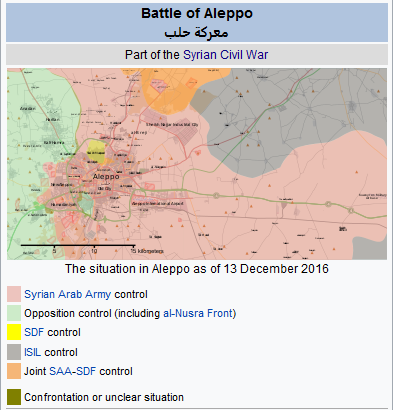A “CENTURIES-OLD NARRATIVE”
by Don Fredrick, ©2016, author of The Complete Obama Timeline

(Dec. 17, 2016) — Obama would have been better off doing nothing about Syria. There is no doubt that President Bashar al-Assad is a brutal criminal, but the United States was not threatened by his regime and has no interests in Syria. Russia, on the other hand, has a naval base in Syria—its only such base on the Mediterranean Sea. In 2011 Obama declared that Assad had to go, and he was not alone in saying that. The problem was that neither Obama nor anyone else had any idea how to get rid of Assad. Nor had they any idea who or what would take his place if he was ousted. Had Obama done nothing, Assad would have quickly defeated the rebels seeking to overthrow him and the situation would have returned to normal. (This is not to suggest that “normal” was ideal.)
Instead, Obama chose to interfere—half-heartedly (or “quarter-heartedly”). He had neither the will (nor the support of the American people) to take military action against Assad. The most Obama could do was “arm the rebels.” The problem was that the rebels were mostly members of the al-Qaeda-related al-Nusra Front. Obama, then-Secretary of State Hillary Clinton, Senator John McCain (R-AZ) and a few others fell all over each other ensuring the nation that they knew who the “good” rebels were. They did not. As a result, weapons, ammunition, and cash flowed to Assad’s enemies in Syria (possibly via Benghazi). That inflow of assistance encouraged radical jihadists to flow into Syria to join the fight.
Meanwhile, Obama was withdrawing all U.S. troops from Iraq. That further enabled the growth of jihadist factions and the formation of ISIS—which conveniently set up its operational base in Raqqa, Syria. Faced with more opposition from Sunni jihadists, Bashar al-Assad sought help from Russia and from Shi’ite Iran’s terrorist subsidiary, Hizbullah. With the help of Russia, Assad was assured that he could outlast the rebels. The fighting intensified and hundreds of thousands of lives—rebels, Syrian troops, and civilians—were lost. But Assad remained in power.
There came a point where Obama could not lift a finger because doing so would mean a confrontation with Russia. That thought apparently never crossed his mind when he insisted in 2011 that Assad must go. Obama had assisted in the ouster of Hosni Mubarak in Egypt and Muammar Gaddafi in Libya—but Russia’s concerns there were minimal compared with its interests in Syria. In Egypt, Obama initially succeeded when the radical Muslim Brotherhood’s Mohamed Morsi won the presidency. But the Egyptian people quickly tossed him out—handing both the Muslim Brotherhood and Obama a defeat. In Libya, Obama failed immediately. The elimination of Gaddafi left Libya in a state of chaos. In Iraq, Obama failed when he withdrew U.S. troops and enabled the rise of ISIS.
Obama’s failures in Egypt, Libya, and Iraq were the result of his inability to look ahead and consider the possible consequences of his actions. His limited faculty-lounge thinking enabled him only to believe, “If I do A, B will result.” He did not consider that A might fail, that other players had their own agendas, or that B might cause C, D, and E. In Syria, Obama believed arming the rebels would lead to Assad’s removal from office. He never considered the consequences of failure. In fact, he never even considered the consequences of success. (If Assad were removed from office, who would replace him?)
Had Obama wanted to eliminate Assad (not that he had any legal authority to do so), the quick solution would have been to bomb his palace. Some civilians would have been killed—but certainly far fewer than have been killed in Aleppo in just November and December of 2016. Once it was clear that Obama would do no such thing, Assad thought he could survive. When Obama failed to enforce his infamous chemical “red line,” Assad knew he would survive. (When there is nothing backing up a “Don’t do that, or else” threat, bullies tend to remain bullies.)
The result has been more than five years of war between the Syrian army and the jihadist rebels. Just weeks before Obama leaves the Oval Office, his ambassador to the United Nations, Samantha Power, lectures the Security Council on the shameless actions of Bashar al-Assad and Vladimir Putin. Power is a few years late to the moral outrage party, and she should stop to consider what part the Obama administration played in the Syrian catastrophe. In its simplest terms, the tragedy falls back into the centuries-old Shia versus Sunni narrative. It is the Hatfields versus the McCoys on a global scale. No one should interfere without knowing what he is getting into, but that is precisely what Obama did. Unprepared to bomb the Hatfields, Obama armed the McCoys—when staying out of the fight altogether might have been the wiser choice.

